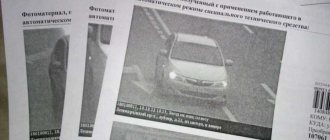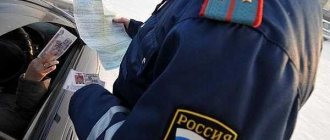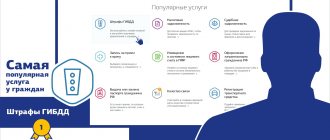How can you avoid paying fines from traffic police cameras?
How to avoid paying fines received from photo and video cameras...
There is probably not a driver in our country who has not received fines from photo and video cameras for traffic violations. In most of these cases, when receiving a fine from a traffic police camera by mail, drivers try to pay it as soon as possible. Especially since the legislative level introduced a 50% discount on the payment of fines for traffic violations within 20 days from the date of the decision to bring to administrative responsibility.
What do you friends think, is it possible to legally avoid paying such fines to the traffic police for photos and video recordings obtained from cameras? Are you hesitant to answer this? It turns out it is possible. But we recommend doing this only to those drivers who do not agree with the decision to impose administrative liability.
What then should those drivers do who have not received such a resolution and only learned about such a fine from a traffic police camera from bailiffs? We invite you, dear motorists, to familiarize yourself with the guide, which will explain to you in detail how you can legally avoid paying fines received from photo and video cameras of the traffic police.
Attention! This guide is not a guide for those who want to legally avoid administrative liability for violating traffic rules. This material of ours is published purely for informational purposes and was selected with only one purpose, to help drivers and car owners of vehicles who were either illegally brought to administrative responsibility or, due to the negligence of traffic police officers or poor quality work of the Russian Post, did not receive theirs on time address the decision to bring them to administrative responsibility for violating traffic rules, which ultimately led these drivers to miss the legal deadline of 20 days to appeal this decision.
When do you need to pay a fine?
Article 32.2 of the Code of Administrative Offenses of the Russian Federation defines the period for payment of existing debt under penalties as 60 days. Upon receipt of an administrative document, there is a legally established possibility of appealing it. If at the end of the regulated period of 10 days from the date of its delivery the complaint has not been filed, it is considered that the owner of the car agreed with the punishment and is therefore obliged to pay the fine amount in full. The duties must be completed within 70 days.
Currently, amendments have come into effect that reduce the sanctions by half, subject to payment of the debt amount no later than 20 days from the date of approval of the resolution. However, this rule does not apply to serious offenses.
If cameras monitoring the road detect violations, a separate procedure for bringing the guilty driver to justice comes into force. Information about non-compliance with traffic rules is sent to the owner of the car by registered mail, which contains a photo of the vehicle and indicates the amount of penalties. The payment period is calculated from the moment the owner signs the notification of delivery of the letter.
Where can you check traffic police fines?
Currently, there are many different online services on the Internet that provide information about administrative fines imposed on drivers and vehicle owners for violating traffic rules. Unfortunately, such a number of different services does not indicate the quality of the services they provide.
The point is this: many services, by their nature, simply duplicate the available information from the official website of the State Traffic Safety Inspectorate and the State Services website, where these services are located, which allow you to request online information about accrued fines for traffic violations. Also, many non-governmental services that provide online information about traffic police fines often contain not entirely objective and up-to-date information that is not accurate or outdated, and therefore can mislead those citizens who use these services. In this case and based on this, we recommend that drivers and car owners use only the following government online services for checking traffic police fines, that is, the following online services:
- 1. On the official website of the traffic police (gibdd.ru)
- 2. On the official website of State Services (gosuslugi.ru)
Let us, gentlemen, consider the following situation. The resolution on bringing to administrative responsibility and imposing a fine for violating traffic rules did not reach you or you simply did not receive it at the post office for some reason (intentionally, or due to poor performance of the Post Office).
Before we directly move on to the description of the legal way not to pay traffic fines received from photo and video recording cameras, let’s first find out what will happen if you don’t pay fines from traffic police cameras?
Pay your attention specifically to the fact that if debit plastic cards have been issued in your name at Sberbank PJSC of Russia, at this (today) moment, according to the law, in case of failure to pay a fine for violating traffic rules within the period established by law, they can unilaterally automatically write off the amount of received fines that were imposed in your name by the traffic police.
See also: How to pay for parking?
Please also note that this can happen even in cases where you have not received a decision to hold you administratively liable and impose a fine on you.
Our editorial office often receives complaints from drivers who claim cases of double debiting of money from Sberbank cards for the same traffic violation. In these cases, citizens have to demand the return of excess amounts written off from Sberbank cards. But this is not so easy to do, since the bank writes off these amounts on the orders of the Bailiffs.
See also: Cancellation of tax notices by mail for payment of transport tax
In this case, you need to keep in mind that in order to get your money back and at the same time return the automatically debited payment from the bank card back to your account, you will first have to contact a bailiff.
By the way, if you think that this cannot happen to you specifically because you always pay fines for traffic violations on time, then you, my friends, are mistaken. How else can it happen? And there are quite a few such cases throughout our large country. For example, such a debit from a bank card can occur even if the information about your payment of the fine has not reached the bailiff.
In this case, the bailiff, due to his lack of information about payment of the fine, will issue a decision to write off this fine debt from your bank account opened with Sberbank PJSC. After which this resolution will be sent directly to the bank, which in turn will take and immediately write off from your account linked to your bank card the required amount of the fine issued to you by the traffic police.
So, friends, keep in mind that paying a fine by you does not mean that information about it will come to the traffic police and the bailiff service on time or at all. After all, it often happens when banks simply delay, for their own reasons, the transfer of information about paid fines to the traffic police, and it often happens when the traffic police, for some reason, forgets to inform the bailiffs about received payments for fines. As a result, it turns out that even conscientious drivers who paid the fine on time can be considered debtors in the bailiff database for a long time.
When does a decision on traffic violations recorded by traffic police cameras come into force?
According to the legislation (Article 31.1 of the Code of Administrative Offenses of the Russian Federation), this Administrative Resolution on violation of traffic rules comes into force, namely:
- after the expiration of the period established for appealing a decision in a case of an administrative offense, if the said decision was not appealed or protested;
- after the expiration of the period established for appealing a decision on a complaint, protest, if the said decision has not been appealed or protested, except in cases where the decision cancels the decision;
What is the deadline established by the Code of Administrative Offenses of the Russian Federation for appealing a decision in a case of an administrative offense?
According to Part 1 of Article 30.3, this period is 10 days from the moment of delivery or receipt of a copy of the resolution to bring a person to administrative responsibility.
Accordingly, in addition to 60 days to pay the fine, you have an additional ten days, which are provided for appealing the administrative decision to hold you accountable for violating traffic rules.
But again, this is all in theory. If you think that you will not receive a resolution to bring you to administrative responsibility and it will not enter into legal force, then you gentlemen are mistaken. You need to know that our legislation is very contradictory and confusing. As a result, our country has developed a special practice for the entry into force of decisions on bringing to administrative responsibility.
Here's the thing. Part 1 of Art. 30.3 and Art. 31.1 of the Code of Administrative Offenses of the Russian Federation stipulates that a decision on bringing to administrative responsibility comes into force after 10 days from the date of delivery or receipt of a copy of the decision, if it has not been appealed or protested, but the officials and bodies that issued the decision are also guided by other norms legislation, namely:
Thus, in accordance with Part 2 of Article 29.11 of the Code of Administrative Offenses of the Russian Federation, a copy of the resolution on bringing to administrative liability (in our example, a resolution on violating traffic rules and imposing a fine from a photo and video camera) is sent within 3 days to the place of residence of the owner of the vehicle, with the moment the decision is made.
If a copy of the resolution imposing a fine for traffic violation was not received by the person who was brought to administrative responsibility, then it is returned to the body that issued the resolution. In this case, the body that issued the decision on a fine for violating traffic rules is guided by the current rules for the provision of postal services in the Russian Federation.
Thus, according to paragraph 36 of the “Rules for the provision of postal services in the Russian Federation”, the postal item is returned to the sender, in particular, if the addressee (or his legal representative) refuses to receive it, as well as in the absence of the addressee at the specified address.
Accordingly, the date of entry into force of the decision in an administrative case for violation of traffic rules will be considered the date of receipt of a copy of the decision back to the body that issued this decision, i.e., due to the absence of the person brought to administrative responsibility at the residence address, or a person who has evaded receiving a decree by mail against receipt.
Thus, in our country there has been an ambiguous practice of the entry into force of decisions on administrative offenses. Therefore, friends, if you have not received a decision on an administrative offense by mail, this does not mean that it has not entered into legal force. Especially if you take into account the fact of how Russian Post works in our country.
However, it is still possible to appeal a fine from traffic police cameras that has entered into force.
Thus, according to Part 2 of Article 30.3 of the Code of Administrative Offenses of the Russian Federation, in the case of a 10-day miss to appeal a decision on an administrative offense, this period can be restored by a judge or officials who are authorized to consider such complaints about missing a deadline.
Now we have come to the most interesting thing in our legislation, which can really help you avoid paying many fines from traffic police cameras. Here's what you should do to achieve this. However, we draw your attention to the following, namely, that our goal of this article is not to teach drivers how to evade responsibility for violating traffic rules.
For our part, we still recommend that drivers pay all traffic fines received to them on time. This is especially true now, when the law provides for the possibility of paying only 50% of the amount of the imposed fine in the first 20 days.
We would also like to draw your attention, friends, to the fact that this article of our material, which tells how not to pay traffic fines legally, can help precisely those drivers and car owners who were illegally brought to administrative responsibility and unfortunately missed the 10-day the period for appealing the decision on fines specifically because of the traffic police, who may not have sent such a decision at all to the place of residence of the person held accountable, as well as because of the unsatisfactory work of the Russian Post, which may have simply lost such a decision to bring you to administrative responsibility .
Is it possible to lose your license for such violations on camera?
The answer to this question is unambiguous and is given by the Administrative Code, but you will have to look at two of its articles at once. Thus, the third part of Article 28.6 of the Administrative Code prescribes the rule that if a violation of the law is detected by an automatic recording camera, then a protocol is not written, but a resolution is immediately issued, which is sent to the offender by mail.
We will not quote the norm given above, but only the passage we need. The full version of Part 3 of this article is available at the link above.
3. In case of detection of an administrative offense provided for in Chapter 12 of this Code…. committed using a vehicle or by the owner, recorded using special technical means operating in automatic mode, having the functions of photography, filming, video recording, or means of photography, filming, video recording, a protocol on an administrative offense is not drawn up, and a resolution on the case on an administrative offense is issued without the participation of the person against whom the case of an administrative offense has been initiated, and is formalized in the manner prescribed by Article 29.10 of this Code.
“So what of this?!” - you say. Indeed, the quoted text does not make it clear what the deprivation of rights for the auto-fixation camera has to do with it. But this rule of law is referred to by another article of the Administrative Code, and it already gives a direct answer to our question. This is part 3.1 of article 4.1 of the Administrative Code:
3.1. In the cases provided for in Part 3 of Article 28.6 of this Code, administrative punishment is imposed in the form of an administrative fine. In this case, the amount of the imposed administrative fine must be the smallest within the sanction of the applicable article or part of the article of Section II of this Code, and in cases where the sanction of the applied article or part of the article of Section II of this Code provides for administrative punishment in the form of deprivation of the right to drive vehicles or administrative arrest and there is no provision for administrative punishment in the form of an administrative fine, administrative punishment is imposed in the form of an administrative fine in the amount of five thousand rubles.
Let's explain the essence of this article in a simpler way:
- In cases where a violation is recorded on camera, only a fine can be issued, and there cannot be any deprivation, arrest, compulsory labor, or the like.
- If an article of the Code provides for a range of fines (for example, for exceeding the speed limit by 60-80 km/h the fine will be from 2000 to 2500 rubles), then the smallest amount from this range should be issued.
- If an article of the Code of Administrative Offenses provides for deprivation or arrest, but does not provide for a fine at all (for example, a repeated violation in the form of driving into oncoming traffic), but if you are caught on a traffic camera, a fine of 5,000 rubles is imposed.
As you can see, everything is quite simple and transparent. The traffic police cannot deprive you of your driver's license using an auto-recording camera.
Something else useful for you:
- Why can there be a traffic police fine of 15,000 rubles?
- Why can there be a traffic police fine of 2,500 rubles?
- Why can there be a traffic police fine of 3,000 rubles?










